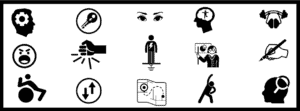INSOMNIA – IS IT MENTAL OR PHYSICAL?
It probably comes as no surprise to you that insomnia can be related to your mental health. But, if that is a surprise, here’s a statistic that might also surprise you. More than half of insomnia cases are related to depression, anxiety, or psychological stress.
Some of the other reasons for insomnia include acute or chronic pain, neurological conditions, nasal/sinus or gastrointestinal disorders, medications, restless leg syndrome, and apnea.
Sometimes, these problems co-occur and you have a real no-sleep perfect storm.
WHAT TO DO ABOUT IT
Obviously, you first want to rule out any medical problems that could be causing your inability to sleep.
Once you’ve done that, or if you suspect both physical and mental components might be contributing to your lack of sleep, you can also address the problem from a psychological perspective.
HOW TO ADDRESS INSOMNIA FROM A PSYCHOLOGICAL PERSPECTIVE
So, what does it mean to address insomnia from a psychological perspective?
It depends on the psychological lens you’re looking through.
Some kinds of psychology work strictly with thought processes and mind control to address your problematic symptoms. In therapies with that perspective, the relationship with the therapist and the talking are both going to help you.
The talking will lead to some tips and tricks to try. And the relationship will help because the “social engagement” of the relationship will put your body in a more optimal nervous system state. That will help you feel better, and perhaps begin to get better sleep.
But to be honest, that’s probably not going to help you tremendously in the case of insomnia.
On the other hand, there are psychological perspectives that see the mind and body as functionally identical.
The problems of the mind can be assessed and addressed via the body, and vice-versa. This is called mind-body psychology, and it is often much more effective than simply talking alone.
HOW MIND-BODY THERAPY CAN HELP WITH INSOMNIA
In mind-body psychology, you will learn tools to adjust the physiology of your body dramatically. You will learn to recognize and let go of the tensions that are keeping you from relaxing into slumber. You will master exercises and postures that will force your body to relax and shift into an optimal state for sleeping.
If it makes sense, you will delve into the stories of your past that contribute to your inability to sleep. By doing so, you will understand some of the beliefs fueling the emotional state that keep you from sleeping. And ultimately, you will sleep.
Sleep is a critical component to feeling good in your body and being able to experience the joy and pleasure life has to offer. If you suffer from the inability to sleep, you’re missing out on that joy and pleasure. Call me. I’ll teach you how to help yourself sleep.
Contact me now to set up your free 15-minute phone consultation









